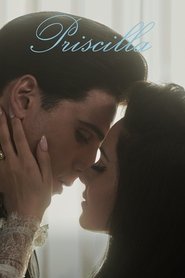I think there only two shots where Elvis is shown alone.
It's strange that at a moment of puritanical discourse around unnecessary sex scenes, along comes Priscilla, a perfect example of a film that really needs a sex scene and doesn't have one. A point is made of Elvis's repeated deferral of the relationship's consummation, and it's hardly prurient to wonder when he topped deferring, especially given Priscilla's age.
— Jessica Kiang (Sight and Sound)
Elvis himself, like many celebrated artists before and after him, struggled with seeing his dreams come true and moving past them. After a while, Priscilla’s doll life at her idol’s side isn’t enough for her, and both their fantasies curdle, as if they’d been let out in the open air for too long. Elvis’ behaviour becomes erratic and violent, and Priscilla wants more out of life. Perhaps Coppola could have done more to show the young woman’s growing dissatisfaction, but the lightness of the ending feels more like an emerging out of a cloud than a rude awakening, which ultimately seems more realistic. The film’s considered and compassionate perspective suggests that, in the years since she left Graceland, Priscilla has arrived at her own understanding of her story—one probably informed by today’s morals and sensibilities, but also by the adult she was finally able to become.
— Manuela Lazic (Cinema Scope)

